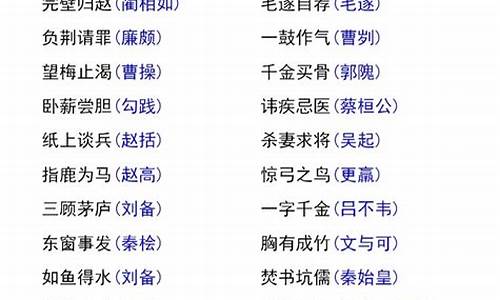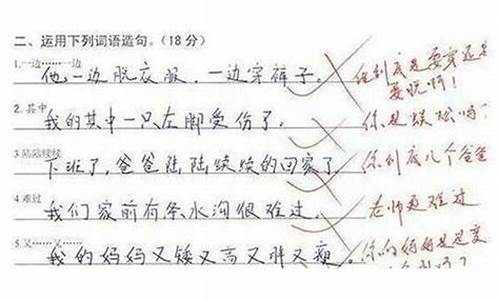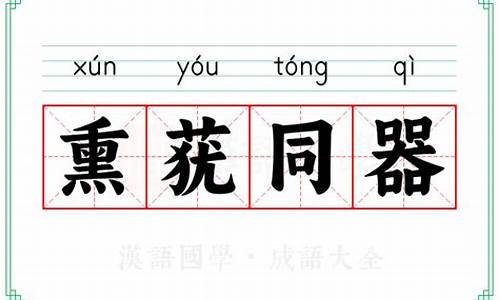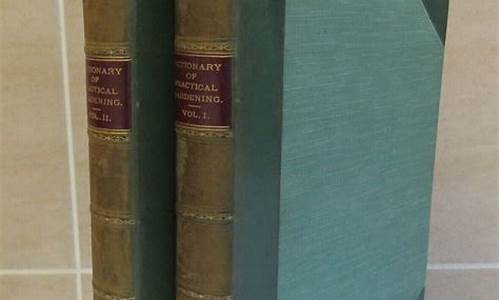您现在的位置是: 首页 > 成语谚语 成语谚语
homely_homely翻译
tamoadmin 2024-10-08 人已围观
简介1.英国英文和美国英文不同的词2.以ly结尾的形容词有哪些3.初中英语语法-以-ly结尾的形容词用法说明英语多前重心,汉语多后重心。在表达多逻辑思维时,英语往往是判断或结论等在前,事实或描写等在后,即重心在前;汉语则是由因到果、由假设到推论、由事实到结论,即重心在后。英语和汉语的重心在句中的位置有时是不一样的,翻译的时候如果不进行调整,势必给表达造成很大的困难。以上是英语跟汉语在思维方式和表达习惯
1.英国英文和美国英文不同的词
2.以ly结尾的形容词有哪些
3.初中英语语法-以-ly结尾的形容词用法说明

英语多前重心,汉语多后重心。在表达多逻辑思维时,英语往往是判断或结论等在前,事实或描写等在后,即重心在前;汉语则是由因到果、由假设到推论、由事实到结论,即重心在后。
英语和汉语的重心在句中的位置有时是不一样的,翻译的时候如果不进行调整,势必给表达造成很大的困难。以上是英语跟汉语在思维方式和表达习惯上的十大区别。只有了解这些区别,才能对英译汉有正确的认识,才能在翻译中抓住重点,找到解决问题的办法。
注意英国英语和美国英语的不同。英美语言之间有很多差异,比如:英国英语中continent指欧洲大陆,而在美语中,continent却指美洲大陆;又如:英语中homely是“家常的、朴素的”的意思,并无贬义,在美语中却是“不漂亮的”。所以翻译时一定要搞清文章是英语作者还是美国作者写的。
“理解是翻译的前提”。只有在准确理解的基础上,才能开始翻译。英语是用大量的关系词、连接词和引导词等连接起来的结构清楚、层次分明、逻辑严密的“形态语”,所以理解的时候就必须理清句子的语法结构,分清句子中各成分之间的语法关系,即找出句子的主干,弄清句子的各个修饰成分以及修饰关系。
英国英文和美国英文不同的词
family家庭 relative亲戚 family bond 亲情
Blood Ties 血缘亲情
Flesh and blood 骨肉亲情
household house
亲情:family
骨肉至亲:Flesh and blood relatives
亲如手足:brotherhood
亲密无间:close
以ly结尾的形容词有哪些
以下这个表很全,左边是英国,右边是美国的说法。
BRITISH TO AMERICAN
Accumulator (automotive) = battery, car battery
Alsatian (dog) = German shepherd
Articulated lorry = tractor-trailer (truck), a "semi"
Ass = donkey; U.S. ass = G.B. "arse," i.e. one's backside (in addition to normal "donkey")
Athletics (an ... meet) = track and field
Backlog = log-jam, pile-up (of business orders, for example). U.S. backlog = comfortable reserve of orders — difference between the two is in opposite interpretation or connotation of same basic situation.
Bank holiday = holiday
Bap = bun, hamburger bun, hamburger roll
Mrs. Beeton = Fanny Farmer (standard cooking, household reference book)
Bespoke = custom-tailored, tailor-made
Big Dipper = roller coaster (at a "Fun-Fair" = "Amusement Park"
Bilberry = blueberry
"Bird" = "chick"
Biro = Papermate (ball-point pen trade name which equals "generic" name)
Biscuit = cookie (U.S. "biscuit" is a baked bread, "bap," "scone"
Blancmange = vanilla pudding
Block, block of flats = apartment building (U.S. term "block" [city block] unknown as such in British English, though usually understandable.
"Bomb" (theater terminology) = a "hit," a great success. U.S. "bomb" = G.B. failure, critical disaster, i.e. the two are exact opposites in sentences like "The play was a bomb!"
Boiler suit = overalls
Bonnet (automotive) = hood (of a car...)
Boot (automotive) = trunk (of a car...)
Bottom drawer = hope chest
Bowler (hat) = derby (special connotations & different pronunc.)
Braces = suspenders; U.S. suspenders = G.B. garters, stocking fasteners
Brambleberry = blackberry
Bottom of the street = end of the street
Box (TV) = Tube (both slang, colloquial terms)
Bull = "mickey mouse" (unnecessary military drill); U.S. bull = G.B. cock
Bum = ass, rectum; U.S. bum = G.B. tramp, derelict
Bun in the oven = pregnant, eating for two
Call box = (tele)phone booth
Camp bed = cot; U.S. cot = G.B. baby bed
Car park = parking lot
Caretaker (for a building) = janitor (not same as "vahtimestari")
Carriage (railway) = railroad car, subway car
Carrier bag = shopping bag
Caucus = permanent group in a political party; U.S. caucus = G.B. ad hoc planning meeting of a group in a political party
Central reservation = median strip (between halves of a divided highway)
Charge sheet = police record
Chemist (drugstore) = druggist
Chips = french fries; U.S. chips often = dried buffalo, cow dung (other cases, i.e. poker chips, wood chips, the same)
Chucker-out = bouncer (doorman or "enforcer" in a bar/restaurant
"In the City" = "on Wall Street" (in main financial district)
City editor = financial editor; U.S. city editor = G.B. "community news editor"
Cloakroom = toilet; U.S. cloakroom = clothes closet, garment storage area
Coach = intercity bus
Combinations = union suit (colloquial for long underwear)
Comforter = scarf; U.S. comforter = heavy quilt, blanket
Compére = Master of ceremonies, M.C. (of TV game show, etc.)
Constable = (police) officer
"To cop" = "to get" something unpleasant, i.e. "to cop a 15-pound fine." U.S. "to cop" = to plead guilty to a lesser charge in order to avoid prosecution & probable conviction on a more serious charge ("to cop a plea" = "plea-bargaining")
Corn = all grain crops; U.S. corn = G.B. "maize" only.
Costermonger = pushcart seller
(Sent to) Coventry = ostracized
Crisps = potato chips
Cupboard = closet; U.S. closet = G.B. w.c., or toilet
Davenport = antique folding writing desk; U.S. davenport = large sofa, often which folds out into a bed at night.
Deposit account = savings account
Dinner jacket = tuxedo ("black tie" formal dress)
Dormitory = bedroom; U.S. dormitory = G.B. residence hall
Dresser = kitchen sideboard; U.S. dresser = bedroom drawers, vanity
"Duck" = "goose egg" (a zero on the scoreboard of a sports match)
Dumb = mute; U.S. dumb usually means "stupid" rather than "mute," which is a secondary meaning in U.S. usage.
Dustbin = garbage can, ashcan (exterior waste-disposal unit)
Dynamo (automotive) = generator (within automobile engine)
Earth wire = ground wire (in electricity, electronics)
Elastic band = rubber band
To Enjoin = to compel, to legally force; U.S. enjoin = to legally forbid — i.e. same term in same general contextual usage has precisely the opposite meaning
Ex-serviceman = veteran; U.S. veteran = G.B. old ex-serviceman; (U.S. term has no special age connotation, only that the person have had prior military experience sometime)
Fag = (a) cigarette; (b) public-school underclass "servant"; U.S. fag = low-slang term for male homosexual.
Fanny = vagina (vulgar usage); U.S. fanny = light euphemism for "backside," either male or female.
First floor = second floor, etc. (Britain walks in ground floor, goes up 1 set of stairs to first floor; U.S. ground floor and first floor are the same.
Fish slice = pancake turner, spatula (kitchen tool); U.S. spatula = G.B. tongue depressor (medical instrument)
Fitted carpet = wall-to-wall carpeting
Flan = pie, fruit pie
Flannel = washcloth; U.S. flannel = heavy warm cotton fabric; "flannels" would be long underwear made from such heavy warm fabric.
Flat = apartment; U.S. flat = tenement flat = poor-standard slum apartment.
Flick knife = switch-blade knife, a switchblade
Flyover = overpass (as in a bridge over a road); U.S. flyover = airplane passing over a certain place, as in military parade "flyovers"; verb is "to overfly."
Form (school) = grade [i.e. first form = first grade in school]
Garden = yard; U.S. garden = vegetable garden, fljower garden, i.e. area of special cultivation. U.S. yard = G.B. paved area (lorry yards)
Goods (car, train) = freight; U.S. goods = supplies, commercial stock
Grind = sexual intercourse; U.S. grind = slang for "hard (routine) work."
Haberdasher = notions seller; U.S. haberdasher = men's clothing seller
To Hack = to (deliberately) kick; U.S. to hack = to chop, cut viciously.
High street = Main street
To Hire = to rent (in most cases); U.S. to hire = to employ Hire-purchase = (the "never-never") = installment plan
Hoarding = billboard (large advertising sign alongside road)
Hold up = traffic jam; U.S. holdup = robbery at gunpoint.
Homely = home-loving, domestic, pleasant; U.S. homely = plain- looking (female), therefore often "left" at home.
To Hoover = to vacuum (carpets, etc.) "Hoover" in the U.S. is a brand name only, never used as a verb.
Inland = internal, domestic (Inland Revenue = Internal Revenue)
Inverted commas = quotation marks (GB = 'xx'; USA = "xx")
Inquiry agent = private detective
Jelly = Jello (deriving from brand name Jell-O, gelatin dessert)
"On the job" = having sexual intercourse; U.s. "on the job" = while working, learning, i.e. "on the job training."
Joint = pot roast; U.S. "joint" = marijuana cigarette
Juggernaut lorry = a very large truck, an overlong truck, a "double semi" truck
Jumble sale = rummage sale
Jumper = light pullover (sweater); U.S. jumper = type of knee- length woman's dress worn over blouse or sweater
Kirby grips = bobby pins (to fasten long hair ...)
A Knock-up = (tennis) to warm up, to volley a few, to practice-volley
To Knock up = to awaken, call early in the morning; U.S. "to knock up" is colloquial for "to impregnate"
Lacquer = hairspray; U.S. lacquer = wood varnish, shellac (high-gloss), i.e. protective decorative wood coating
Ladder = (in women's stockings" = a runner, a run
Lay-by = (beside a road) = a pull-off, a rest area.
Left-luggage office = check room, baggage check (room)
Level crossing = railroad crossing.
Lift = elevator
Lip balm = chapstick
Logic-chopping = splitting hairs, hair-splitting
Long jump (in athletics) = broad jump (in track and field)
Lorry = truck
Loud-hailer = bullhorn, amplified megaphone
Lucky dip = grab bag (children's party game or activity ...)
Lumber room = spare room, storage room (in a home)
Mackintosh = raincoat, overcoat, trenchcoat
Mains = ordinary built-in home electrical network (no special word as equivalent in U.S.)
Market garden = truck farm
Marrow (vegetable) = squash, gourd
Mason = stoneworker; U.S. mason can be stone- or brickworker
Marriage lines = marriage certificate
Mean = stingy, tight with money; U.S. "mean" normally means nasty, spiteful, ill-meaning in action toward another
Mess kit = formal military dress for ceremonial dining; U.S. mess kit = army or boy scout utensils for cooking or eating a meal on the trail.
Minced meat = hamburger meat, ground beef; U.S. mincemeat = sweet, spicy ground meat/fruit/nut combination used for making pies, especially around Thanksgiving/Christmas
Mineral water = any carbonated soft drink; U.S. mineral water = bottled natural water (containing normal minerals) from spring or health spa, Perrier water, etc.
Mistress = teacher in girls' school; U.S. mistress = lover (extramarital)
Mob = gang, group (neutral); U.S. mob = angry crowd; "the mob" = Mafia
Motorist, motoring = driver, driving
Music Hall = vaudeville (generic entertainment type/place name)
Nappy = diaper (for infants not toilet-trained)
A Neat drink = a straight drink, i.e. "give me a straight whiskey" = whiskey without water or other additives
Nervy = nervous, jumpy; U.S. nervy = bold, impertinent, i.e. nearly the opposite of the British usage
Night club = private membership club; U.S. nightclubs are public (commercial) entertainment places
Number plate = license plate (on automobiles)
Off-license = liquor store
Old boy (girl) = alumni, alumnus, alumna [of a school]
Pantechnicon = moving van
Panda car = police patrol car, police cruiser
Patience (card game) = Solitaire
Pecker (keep your pecker up) = keep your chin up; U.S. pecker = penis
Pram (peramulator) = baby carriage, baby buggy, stroller, walker
Petrol = gasoline, gas (to go in automobiles, airplane, etc.)
Pie = meat pie; U.S. pie is always a fruit or fruit-derived pie, unless "a meat pie" is specifically indicated
Pillar-box = mailbox, post office box, letter box, letter drop
Pissed (he was really...) = drunk; U.S. "pissed = angry, upset
Pitch () = field (football) [GB "football" = US ""]
Plimsolls = sneakers, tennis shoes, gym shoes
Point = electric outlet, railroad switch (depending on context)
Polka dots = chocolate chips (food product for baking)
Prawn = shrimp
Prom, prom concert = music concerts where most of the audience is standing; U.S. prom = dance, semi-formal, especially at end of year in high schools, colleges
Rates = local, municipal property taxes
Redundant = laid off (from a job); U.S. redundant = superfluous (no connotation of connection with jobs at all)
Return ticket = round-trip ticket
Ringway = circular road (around a city), bypass
Rise = raise in salary
To Roger = to "screw," have sex with; to exploit, take advantage of, to use
Roll neck (pullover) = turtleneck (sweater).
Roundabout = traffic circle
Rubber = eraser; U.S. rubber = condom, prophylactic device
Saloon = "sedan" car (automobile); US saloon = western-style bar
Saloon bar = one section of an English pub
Sanitary towel = sanitary napkin, feminine hygienic item
A good screw = a good salary; U.S. "good screw" equals good "" or good sexual experience
To Screw = to cajole, persuade, extract money from; U.S. "to screw" = to have sex with, fornicate
Season ticket = commuter (train, bus) weekly or monthly ticket; U.S. season ticket is admission ticket to all home games in one season of a particular sports team
To Second to = to temporarily loan staff to another job or unit
Sellotape = Scotch tape (both brand names now used as "generics"
"Semi" = duplex, duplex house; U.S. "semi" = tractor-trailer truck rig
Seminary = Roman Catholic seminary only; U.S. Seminary can be ANY religion, i.e. Lutheran, Methodist seminaries
Sherbet = powdered, fruit-flavored candy; U.S. sherbet = G.B. sorbet (pronounced "soorbay")
Shorthand-typist = stenographer
To shy = to throw something (he shied a rock at the stray dog...)
Sideboards = sideburns (in a hairstyle)
Single = one-way ticket; U.S. "single" in context would mean "only one" as opposed to "several" tickets
To Snog = to neck (i.e. kissing, hugging, etc., esp teenagers)
Spinster = any unmarried woman; U.S. spinster is always OLD unmarried woman
Standard lamp = floor lamp (as opposed to table or wall lamp)
S.T.D. (subscriber trunk dialling) = direct distance dialling [on the telephone, as opposed to dialling through operator]
Steps = ladder; U.S. "steps" always would mean staircase, built- in stairway or staircase
To stream (pupils in a school) = to track (streaming = tracking)
Stroke (punctuation) = diagonal, slash
To Stuff = to fornicate, have sex with; U.S. "I'm stuffed..." = to be comfortably, pleasantly full of food, satiated
Sub-editor = copy reader or rewrite person, in journalism
Subs = dues, as in union dues, etc.
Subway = underground walking passage, underpass, pedestrian tunnel; U.S. subway = G.B. "underground," i.e. underground railway system for public transportation
Superannuation scheme = retirement pension plan
Supply teacher = substitute teacher
Supertax = surtax
Surgery = a doctor's office, office hours, reception time; U.S. "surgery" refers to "surgeon" operating on a patient
Suspenders = garters, for socks or stockings only; U.S. suspenders = G.B. braces, for holding up trousers
Sweet = dessert, or piece of candy
Sweetshop = candy store
To Table (parliamentary procedure, conference terminology) = to put on agenda for immediate handling; U.S. "to table" = to put aside [indefinitely], to delay further handling
Tannoy = public address (p.a.) amplification system
Teat = baby bottle nipple; US teat = GB nipple = breast nipple
Terrace house = row house, garden apartment, town house
Are you Through? (telephone) = are you connected; U.S. "are you through"? = are you finished, completed, with your call
To tick = to check, place check mark beside
Tights = hose, panty hoseh, nylons, nylon stockings; U.S. tights = leotards, skin-tight exercise suit, knit stocking pants
Tinkle = telephone call [give me a tinkle sometime]; U.S. "tinkle" = children's talk for "to urinate"
Tip = garbage dump; U.S. tip = hint, advice, clue
Torch = flashlight; U.S. torch = burning, flaming light or weapon
Touchline = sideline (in sports, such as on pitch, etc.)
Tower block = high-rise apartment building
Trade union = labor union (but usually organized by "trades" in England, by "industry" in the U.S. — US "Auto Workers' Union" would be represented by different "trades" in GB)
Tram = streetcar, trolley car
Transport cafe = truck stop (roadside cafeteria, restaurant, popular with truck [lorry] drivers
Traveller = travelling salesman
Treacle = molasses
Trousers = pants; U.S. pants = G.B. underwear shorts
Trunk call = long-distance call (on a telephone)
Turn it up (colloquial) = stop it, cut it out! U.S. "turn it up" = increase the volume
Undercarrige = landing gear (aircraft)
Underdone = rare (extent to which you wish your meat cooked)
Underground= subway (cf "subway")
Vest = undershirt; U.S. Vest = G.B. waistcoat
Windscreen (automotive) = windshield
Wing (automotive) = fender, bumper (pre-70s designs...)
White spirit = turpentine, paint thinner; U.S. "white lightning" (spirits) = potent home-distilled backwoods alcohol!
Wholemeal = whole-wheat (bread, flour, etc.)
Yankee/Yank = any American in general, U.S. Yankee = Northeast erner ONLY, i.e. specific regional, historical definition
Zebra crossing = crosswalk, pedestrian crossing (Ped Xing)
"Zed" = "Zee" (pronunciation of last letter in alphabet)
初中英语语法-以-ly结尾的形容词用法说明
1.某些表示时间的形容词。
常用的有:hourly每小时的, daily每天的, nightly每晚的, weekly每周的,biweekly两周一次的,monthly两月的,bimonthly两月一次、一月两次的,quarterly每季度,yearly每年的,biyearly两年一次的、一年两次的,early早的,timely及时,untimely不合时宜的,等等。
2.某些表示人的形容词。
常用的这类词有: manly男子气的, unmanly无男子气的,womanly女人气的,wifely妻子似的,fatherly父亲般的,childly孩子般的,comradely同志式的,lordly贵族似的,princely君王的,scholarly学者派头的,等等。
3.某些表示人的外貌、特征、性格、心理等的形容词。
常用的这些词有:ugly丑的,homely不漂亮的、朴实的,comely漂亮的,portly肥胖的,lively活泼的,melancholy忧郁的,lonely寂寞的、孤单的,friendly友好的,unfriendly不友好的,kindly亲切的,wily诡计多端的,silly愚蠢的,cowardly胆小的,miserly吝啬的,niggardly 小气的、有礼貌的,sick-ly有病的, poorly身体不舒服的,beastly讨厌的,unruly不守规矩的,bastard-ly私生的、卑鄙的,burly魁梧的、粗鲁的,elderly较老的、年长的,unschol-arly没有学问的,等等。
4.某些表示事物特征、环境、情况、状态的形容词。
常用的这类词有:likely可能的、合适的,costly花费大的,orderly整齐的,chilly凉的,deadly致命的,deathly如的,curly卷曲的,cleanly干净的,mannerly有礼貌的,masterly巧妙的、熟练的,rascally流氓的,chapely怡人的,sightly悦目的,goodly相当大的,shingly多小石子的,oily多油的,lowly卑鄙的,wooly毛的,unsightly难看的,ungainly笨拙的,stately堂皇的、威严的,crumbly易碎的,bodily肉体的,grisly可怕的,prickly多刺的,only唯一的,bally异常的,bubbly多泡的,seemly合适的,ghastly可怕的,等等。
5.某些表示天、地(包括方位)、神、鬼等的形容词。
常用的这类词有:heavenly天的, earthly大地的、世俗的, unearthly非人间的,worldly凡俗的,easterly东方的、向东的,southwesterly向西南的、自西南的,godly敬神的,unholy不信神的,ghostly鬼一般的,等等。
以-ly结尾的形容词用法说明
英语中,以-ly结尾的单词基本上是副词,也就是说词尾-ly是副词的标志,但是值得特别注意的是,有些单词以 –ly 结尾却通常用作形容词。如:
1. 一些表示人的名词加–ly构成形容词。如 friendly, manly, womanly, brotherly, sisterly, wifely, comradely, husbandly等。这类形容词除friendly可做表语外,其余的一般都只用作定语,表示被修饰的名词具有某类人的性格特征。如:
He spoke in a friendly way. 他说话的态度很亲切。
The boy walked with a manly stride. 那男孩走路迈着大人的步子。
2. 某些表示时间的名词加–ly构成形容词。如 timely, hourly, daily, weekly, yearly, monthly, quarterly等。这类形容词一般用作定语,而不作表语,不用very修饰。如:
What is my weekly wage? 我的周工资是多少?
We pay a yearly visit to my uncle. 我们每年都要看望我的叔叔。
We cannot be thankful enough to you for your timely and selfish help. 我们对你们及时而无私的援助真是感激不尽。
3. 某些表示地点的名词加–ly构成形容词。如 homely, worldly等。如:
It’s a homely meal. 那是一顿家常便餐。
4. 某些描述性的名词加–ly构成形容词。如:lovely, likely, lively, lonely, sickly等。如:
What lovely flowers those are! 那些花多么好看啊!
She is the most likely girl to win the prize. 她是最有希望得奖的女孩。
5. 某些词尾为–ly的固有单词,如:early, silly, ugly等。除early可作副词外,silly, ugly只能做形容词。如:
You were very silly to trust him. 相信他, 你可真愚蠢。
I don’t like the ugly look of that hole in the gable. 我不喜欢山墙上的那个难看的窟窿。









